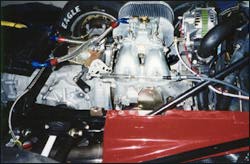
![]()
Formula Mazda (FM) is the only spec formula class in road racing and is
now qualified to run with the fastest SCCA classes
on a national level.
In Formula Mazda your performance is based on how you do on the track, not on a large
budget or secrets performed in the shop. It's a simple concept: all racers are in equally
matched race cars, and the winner is determined by driver skills, along with suspension
set-up and aerodynamics.
The FM chassis is a strong, proven design with well-mannered handling characteristics that
makes for an easy handling car. Double wishbone and rocker arm suspension members are
attached to the chassis with shear plates. This ensures relatively quick and easy damage
repairs.
 These race cars are all custom built around the low maintenance Mazda 13B Rotary Engine
which puts out an effortless 175 hp, and does so with bullet-proof reliabilty. It's not
unusual for the dyno tested and sealed motors to remain in cars for over three seasons
without a rebuild. Compare the maintenance costs of a FM engine to that of any other class
and you'll realize why they are gaining popularaity.
These race cars are all custom built around the low maintenance Mazda 13B Rotary Engine
which puts out an effortless 175 hp, and does so with bullet-proof reliabilty. It's not
unusual for the dyno tested and sealed motors to remain in cars for over three seasons
without a rebuild. Compare the maintenance costs of a FM engine to that of any other class
and you'll realize why they are gaining popularaity.
At SCCA National and Regionals, Formula Mazdas compete in their own FM class. Prior to
1998 they ran with Formula Atlantic in a combined class introduced in 1996. Drivers have
discovered they can now move up to a faster class without paying the higher costs normally
associated with such a change. FM events are now drawing up to 40 cars per race and have
quickly outgrown their beginnings in the western U.S. and are attracting new owners
internationally.
CAR SPECIFICATIONS
|
||||||||||||||||||||||||||||||||||||||||||||||||||||||||||||||||||||||||||||||||||||||||||||||||||||||||||||||||||||||||||||||||||||||||||||||||||||||||||||||||||||||||||||||||||||||||
| Home | Formula Racing | Charities | Sponsor Opps | The Team Race Schedule | Gallery | Tracks | Guestbook | Press | Merchandise |Email |